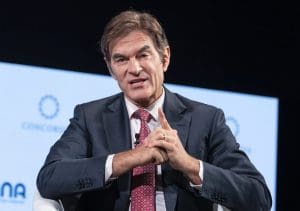Biden administration ousts Senate candidates Oz and Walker from US fitness council
Donald Trump had appointed both Senate hopefuls to the President’s Council on Sports, Fitness & Nutrition before he left office.

President Joe Biden asked two holdover Donald Trump appointees on the President’s Council on Sports, Fitness & Nutrition to resign or face removal on Wednesday, now that both are running for U.S. Senate. Federal law prohibits members of the advisory committee from running for partisan political office while doing those jobs.
Former football player and “Celebrity Apprentice” contestant Herschel Walker, who is running for the GOP Senate nomination in Georgia, was selected by Trump to the council in May 2018 for a two-year term. Mehmet Oz — host of the “Dr. Oz” television medical talk show — who is seeking the GOP nomination for Senate in Pennsylvania, was appointed and reappointed at the same time. Both were reappointed by the lame-duck president in December 2020 for another two years.
Oz announced his campaign last November, seeking the open seat of retiring Sen. Pat Toomey (R-PA). Walker declared his candidacy last August, hoping to challenge Sen. Raphael Warnock (D-GA).
In separate letters, the Biden administration asked for their resignations by 6 p.m. on Wednesday and informed the candidates that their positions “will be terminated” at that time otherwise.
According to CNN, both were in apparent violation of the Hatch Act, which says that special government employees like members of the council “may not be candidates in partisan elections” while doing those jobs.
Paul Seamus Ryan, vice president for policy and litigation at the watchdog group Common Cause, said in an email on Thursday that he agreed with CNN’s take that the appointees were likely not permitted to run for partisan office while serving on the committees under the Hatch Act.
Ryan explained:
Members of federal advisory committees are deemed “special government employees” under federal law (18 USC 202). As such, members of federal advisory committees are subject to Hatch Act restrictions while performing work for the federal government. CNN included the qualifying phrase “while conducting official government business” to convey this aspect of Hatch Act application. Whereas some activities prohibited by the Hatch Act are discreet and can be performed by an advisory committee members while not “on duty” as a federal employee (e.g., soliciting a contribution, hosting a political fundraiser), being a candidate for partisan office is not such an activity. A person is a candidate from the time they announce their candidacy (or otherwise become a candidate by operation of law) until the election is over; it’s impossible for a candidate to turn off their candidate status in order to fulfill their duties as a federal advisory committee member.
A spokesperson for Oz did not respond to questions about the Hatch Act but pointed the American Independent Foundation to a statement and video message from Wednesday evening, in which the candidate accused Biden of politicizing health and suggested that he should instead fire the nation’s top epidemiologist Dr. Anthony Fauci, who is not running for elected office.
“I’ve got no intention, my friends, of resigning. None,” Oz vowed, noting that Biden would have to fire him instead.
A Walker campaign spokesperson did not immediately respond to an inquiry for this story.
Hatch Act violations are nothing new for the people Trump brought into the federal government.
The 1939 ethics law aims to prevent public officials from blurring the lines between their official duties and partisan political activity — and makes sure that employees are promoted based on merit, rather than campaign work.
According to the Office of Special Counsel, “at least 13 senior Trump administration officials did violate the Hatch Act prior to the election” in 2020.
In a November 2021 report, the watchdog agency wrote: “Each of these high-profile violations was committed by an official OSC believes, based on current law, could only have been disciplined by then-President Donald J. Trump. Thus, the cases described herein demonstrate both a willingness by some in the Trump administration to leverage the power of the executive branch to promote President Trump’s reelection and the limits of OSC’s enforcement power under the existing statutory scheme to prevent them from doing so.”
Trump ran in 2016 on a five-point ethics plan that he said would “make our government honest again.” But during his single term in the White House, he did virtually nothing to actually “drain the swamp” as he promised and allowed thousands of alleged conflicts of interest and ethical violations.
Update, 11:47 a.m.: A spokesperson for Walker’s campaign shared a tweet from Walker in response to an inquiry for this story. “President Biden is so scared about us beating Raphael Warnock that he has asked me to resign from my unpaid position on the President’s Council on Sports, Fitness, and Nutrition,” Walker wrote on Thursday morning. “I’m not a quitter so you are going to have to fire me.”
Published with permission of The American Independent Foundation.
Recommended

New NC GOP chair flirts with bogus stolen election conspiracies
Simmons predecessor was a staunch 2020 election denier
By Jesse Valentine - April 19, 2024
Texas activists pushed abortion restrictions in NM cities and counties, records show
Emails reveal influence and control in exchange for promises of legal help
By Austin Fisher, Source NM - March 04, 2024
Cannabis workers across Missouri begin push to unionize dispensaries
The first day was a breeze. Sean Shannon and Danny Foster walked into several marijuana dispensaries around Missouri with their matching “Union For Cannabis Workers” shirts and talked to employees about the possibility of unionizing. “The first day, there were 57 stops amongst the teams,” said Shannon, lead organizer with UFCW Local 655, which actually […]
By Rebecca Rivas - December 04, 2023









































































